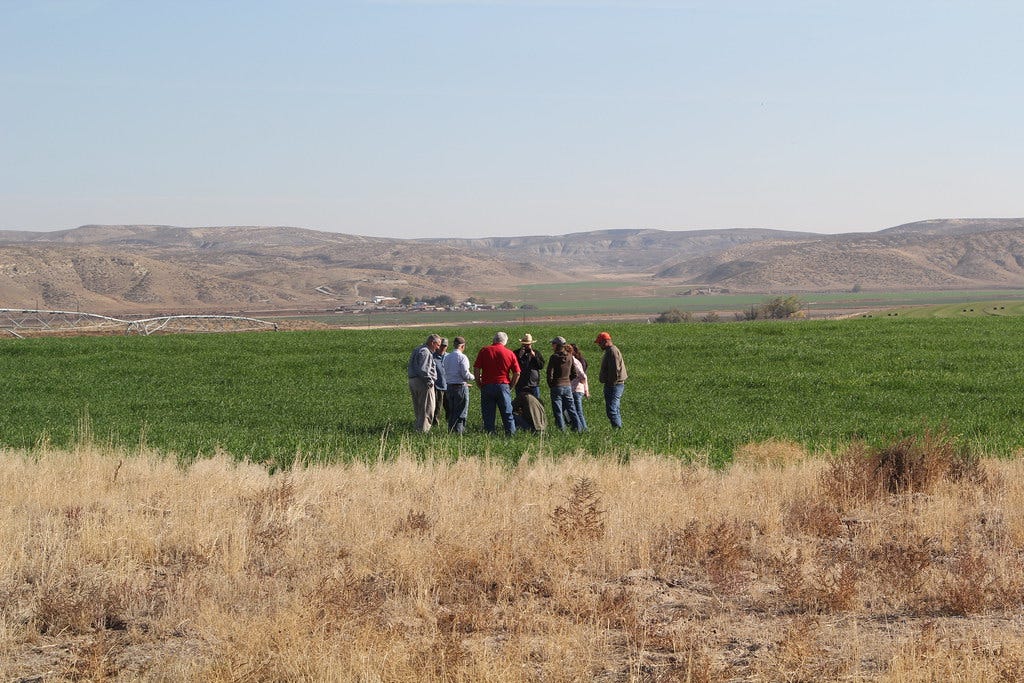Kim Phelps: Rural Conservativism and Neighborly Tolerance
I know there are lessons to be learned from two ideologically-opposed farmers building something together, not to mention forging a friendship. I think it’s on all of us to identify those lessons.
Country of origin: southern Humboldt County, California. Education: U.C. Santa Barbara, undergraduate. U.C. Davis, graduate studies, literature.
Rural Conservativism and Neighborly Tolerance

"Healthy Soil Maximizes Moisture, Boosts Profits for Oregon Farmer" by NRCS Oregon is licensed under CC BY-ND 2.0
A paradox: a farmer with ferociously bigoted opinions about national issues can chair a meeting of his ditch association, and show himself to be extraordinarily patient and scrupulously honest, with a ready willingness to compromise, finding the best solution to problems that are difficult because no one solution can satisfy everyone.
It’s not such a paradox, really. People who live in small rural communities, if they have any sense at all, develop the habit of patience with their neighbors, and with everyone in general. It’s the only way to survive. If you have harsh words with someone, you’re bound to see him the very next day in Safeway; one of his kids will be in the same class as one of yours; he’ll be the only plumber available next week when you need one. No, we all have to get along, and those who are unable to are quietly marginalized—not asked to be on school boards or ditch committees.
So why do people who have developed such civil habits show such impatience, intolerance, and often anger when considering (and voting on!) national issues? There is not a simple answer to this question. To begin with, rural conservatism is not monolithic. Our eastern Oregon county has voted solidly Republican ever since I can remember (the early 80s), but for reasons that vary from person to person. My wife and I moved here in 1982. About a year later, my old friend Keith visited us. He was somewhat worried about our burying ourselves, as he thought, in a remote corner of Oregon. The first day he was here, we drove into town and around the valley. He noticed the number of churches, and the tidy appearance of most of the farms. He said, “The forces tending toward conformity must be pretty strong around here.”
I said, “You couldn’t be further from the truth. There are more eccentrics per square mile here than in any other place I’ve ever lived.” It’s true. Some of the people do have definite political and social opinions; a great many more are just vaguely disgruntled when they consider national issues—so they vote for the candidate or party that sounds disgruntled or angry too, and in recent decades this has been the Republican party. One of the Republican candidates in the present election has signs saying, “Fighting for Eastern Oregon.” Why couldn’t he say, “Thinking for Eastern Oregon”?
The impulse to vote out of vague dissatisfactions is understandable. We have to be civil at home, but statewide or national issues are farther away, and it’s a relief to vent about them. These are the votes that elected Jesse Ventura in Minnesota, Arnold Schwarzenegger in California, and Donald Trump in rural areas of the country—throwaway votes, protest votes, joke votes. So how can we persuade people who are so conscientious in their private lives to be a little more responsible when they vote? Let them vote for whichever candidate they please, but for better reasons, or at least for some reasons. Come on!
Don’t expect an answer from me to this last question. Gut-feeling voting rather than thoughtful voting is the order of the day, more so than in the past, and how to turn this around is a nationwide social issue. I can’t attempt to address it. But the tolerance and generosity that rural folks have on a personal level shows they are not irredeemable.
A farmer I worked for for several years was a fervent—no, fervent is too mild a word—he was a fanatical Catholic. Issues like abortion, prayer in schools, etc. were the forefront of his politics. Very soon he realized I not only was not Catholic, but probably was an out-and-out pagan. We were busy that spring, however, and getting things done took priority over converting the help. The second week I was there, he and I built a stackyard—a fenced area on the side of a field to stack bales in. It took all morning, and when we were done he squinted down the fence line and said, “Well, not bad for two ideologically opposed farmers.” We always got along well, and he is still a friend. Neither of us ever changed the other’s opinions; but he does consider me an exception to the rule that all Democrats are worthless human beings, so that rule now has cracks in it. And I know him as a kindly and generous person, despite his opinions.
**********************
Keep the conversation going: Facebook (facebook.com/oregonway), Twitter (@the_oregon_way)



